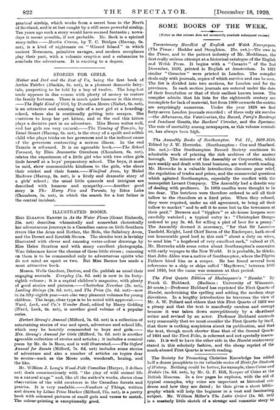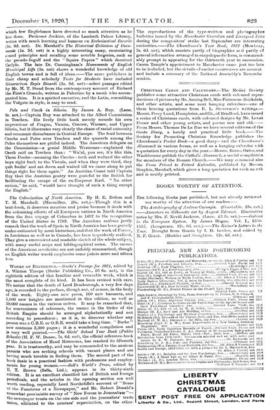The Society for Promoting Christian Knowledge baa added half a
dozen pamphlets to its valuable series of Hints for Students of History. Nothing could be better, for example, than Coins and Medals (is. 6d. net), by Mr. G. F. Hill, Keeper of Coins at the British Museum. In a few pages he explains, with the aid of typical examples, why coins are important as historical evi- dence and how they are dated ; he then gives a short biblio- graphy which will help the beginner in a vast and fascinating subject. Mr. William Miller's The Latin Orient (1s. rid. net) is a masterly little sketch of a strange and romantio story to which few Englishmen have devoted so much attention as he has done. Professor Jenkins, of the Lambeth Palace Library, writes with much learning and humour cc Ecclesiastical Records (Is. 9d. net). Dr. Marshall's The Historical Oriticiem of Docu- ments (Is. 3d. net) is a highly interesting essay, enunciating sound principles and recalling some notable forgeries, such as the pseudo-Inguff and the " Squire Papers " which deceived Carlyle. The late Dr. Cunningham's Monuments of English Municipal Life (Is. net) shows a wonderful knowledge of old English towns and is full of ideas.—The same publishers in their cheap and scholarly Texts for Students have included hinerariuns Regis Ricardi 9d. net)—select passages edited by Mr. M. T. Stead from the contemporary account of Richard the First's Crusade, written in Palestine by a monk who accom- panied him. It is a spirited narrative, and the Latin, resembling the Vulgate in style, is easy to read.







































 Previous page
Previous page